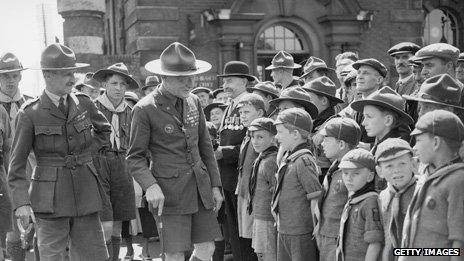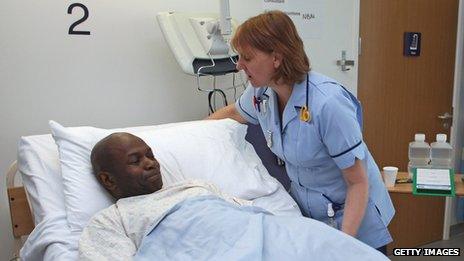Scouts, Starbucks, the Sun and Sister: Who is doing their duty?
- Published
- comments

What do current news stories about the Leveson report, Starbucks, nursing and the Scouts have in common? They all have an underlying theme - what it means to do one's duty.
As a young cub with the First Glasgow Scouts in the 1960s, I remember feeling a profound sense of solemnity and significance as I saluted and intoned the promise, on my honour, "to do my duty to God and to the Queen".
As the scouting movement debates whether atheists should be able to opt out of the "God" bit, I have been thinking about the "duty".
It is a word that underpins many of the public debates of our times.
Today, nurses are being encouraged to act upon the personal duty of care they owe their patients; newspaper editors are trying to convince the prime minister they will respect the duty to maintain the highest press standards; big businesses and wealthy individuals are being reminded by the chancellor of their duty to pay their fair share in taxes.
In all three cases, the concept of duty goes beyond legal or statutory obligations to encompass what is morally right. At issue is whether we can and should trust Sister, Starbucks or the Sun to do the right thing.
When we talk about children learning the difference between right and wrong, we forget that young people often have a far more black and white view of such matters than their elders. The duties of a Scout stem from a sense of personal obligation to live life according to a code of conduct, without earthly sanction.
The scout law exists, but no cub or beaver is going to get punished for not being considerate, courageous or careful with possessions. The promise is about doing one's best, on one's honour. The duty is founded upon individual integrity and social trust.
This appeal to intrinsic human decency acts very powerfully on the young. Just as Father Christmas knows whether you have been good or bad, so children often see no blurred edges in the boundary between naughty and nice.
And the side of the line you end up on, children believe, is down to you.
The newspaper editors meeting David Cameron today think the press should be regulated in the same way. The Press Complaints Commission code, external begins with an acceptance that "all members of the press have a duty to maintain the highest professional standards".
But it is a duty that the Leveson report found had been breached on "far too many occasions", causing real hardship and wreaking havoc on the lives of the innocent. Trust and personal integrity had not been enough to ensure standards were upheld.
When the government talks about the immorality of those who "aggressively" avoid paying tax, they are referring to a personal rather than legal duty. Starbucks is being exhorted to do the right thing even if that is not necessarily an obligation in law.

Nurses are bound by a duty of care
Registered nurses also promise to abide by a duty to "make the care of people your first concern, treating them as individuals and respecting their dignity". The phrase is one of the first in the code of conduct, external operated by the Nursing and Midwifery Council and it is that sense of obligation that England's chief nursing officer is referring to when she says action must be taken to ensure the values nurses stand for are not betrayed.
But such promises and commitments are not enough for public sector workers and organisations. For nurses and many others, the "duty of care" is now both a legal and professional obligation.
Indeed, the area covered by statutory duty has expanded hugely in the last couple of centuries. When a boy lost an arm in the cog-wheels of a steam winch owned by Lord Wimborne, the courts ruled in a landmark judgment in 1898 that the factory boss had breached an absolute duty imposed on him by statute.
The root of the word duty is the Latin verb "debere" - "to owe", or "to have to". It is about debt, that which is due or owing.
As such, it is not a passive concept. It requires the active fulfilment of an obligation. Lord Wimborne had a positive duty to protect the boy from the cog-wheels by ensuring there was a safety guard or fence.
In the public sector, specific legal duties in relation to race, disability and gender have now been incorporated into a general public duty, backed by the law. But there are also the non-statutory so-called "Nolan principles", external as set out by the Committee on Standards in Public Life following the sleaze scandals of the mid-90s.
The seven principles, now enshrined in the ministerial code, are selflessness, integrity, objectivity, accountability, openness, honesty and leadership. The code echoes the Scout Promise with its demands for trustworthiness, loyalty, consideration, courage, care and respect.
I like to imagine the Cabinet saluting as they intone the Nolan principles at the start of each day.
At issue is whether we can trust each other to "do our best to do our duty". Trust is in short supply. We need to believe that people have a sense of duty born of moral and ethical principle rather than the law. But our confidence in the integrity of those with power is at an all-time low.